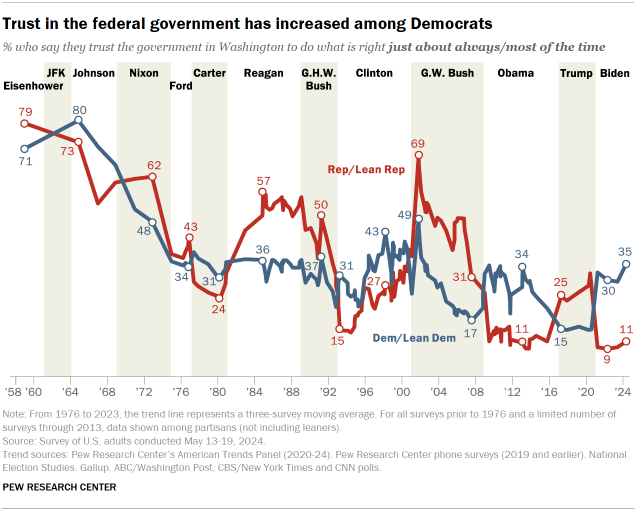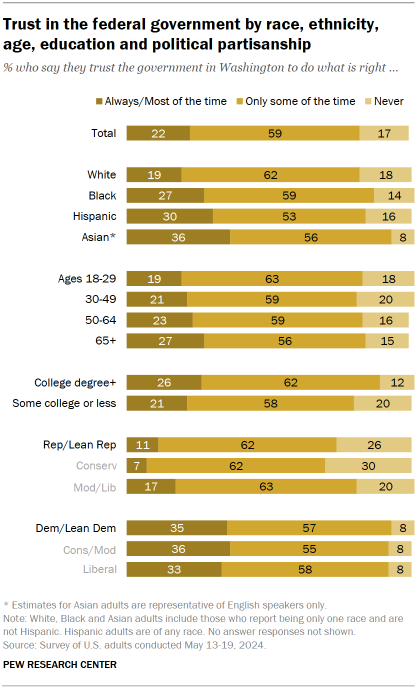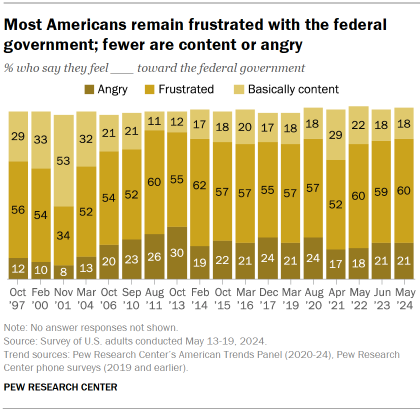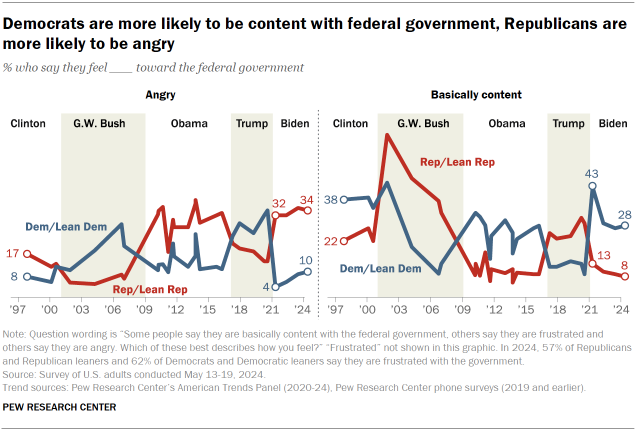Americans’ trust in the federal government, which has hovered at or near record lows for nearly 20 years, has modestly increased over the last year. Still, only about two-in-ten Americans say they trust the government in Washington to do what is right.
Frustration also remains the dominant feeling among the public, as it has for two decades – with a 60% majority now saying this. Far smaller shares say the federal government makes them feel either content or angry.
Trust in government
Roughly two-in-ten Americans (22%) say they trust the government in Washington to do what is right just about always or most of the time.
A majority of Americans say they trust the federal government “only some of the time” (59%), while 17% say they never trust it.
Trust in the federal government is up from a year ago, when 16% said they trusted the government at least most of the time.
Trust in the federal government has been consistently low for the last several decades, and today’s level is comparable to levels of trust in 2022 and 2021.
For more on trust in the federal government over the last 70 years, please visit our trust interactive.
Partisan and demographic differences in trust in government
Americans tend to trust the federal government more when the party they associate with holds the White House. Today, 35% of Democrats and Democratic-leaning independents say they trust the government almost always or most of the time, a somewhat larger share than in recent years. As has been the case since the beginning of Joe Biden’s administration, only about one-in-ten Republicans and Republican leaners say they trust the government to do what is right.

- Throughout Biden’s presidency, Democrats have been more likely than Republicans to trust the federal government.
- During Donald Trump’s administration, Republicans expressed higher levels of trust than Democrats did.
- 7% of conservative Republicans trust the government all or most of the time, compared with 17% of moderate and liberal Republicans.
- There are no substantial ideological differences among Democrats on this question.

Asian (36%), Hispanic (30%) and Black (27%) adults are more likely than White adults (19%) to say they trust the government all or most of the time.
Age and educational differences in trust in government are relatively modest.
Adults under age 50 express somewhat less trust in the federal government than those who are older (20% always/most of the time vs. 25%).
Americans without a college degree (21%) are somewhat less likely than those with a college degree (26%) to say they trust the federal government all or most of the time.
Feelings toward the federal government
A majority of Americans say they feel frustrated – rather than angry or content – with the federal government. This has been the dominant emotion for much of the last several decades – with the sole exception being the period shortly after Sept. 11, 2001.

Today, six-in-ten Americans say they feel frustration toward the federal government, while 21% say they feel anger and 18% say they feel basically content.
The balance of Americans’ feelings toward the federal government have been largely unchanged in the last few years.
Partisans’ feelings toward the federal government shift with the occupants of the White House

Frustration toward the federal government is the dominant emotion for both Republicans and Democrats, regardless of which party is in control of the White House. But partisans’ anger with government is higher when administrations from the other party are in power. Contentment is higher among people who favor the party of the president.
Today, 28% of Democrats and Democratic-leaning independents say they are content. Just 8% of Republicans and Republican leaners say this.
Conversely, 34% of Republicans currently say they feel anger toward the government in Washington. Only one-in-ten Democrats say they are angry.




